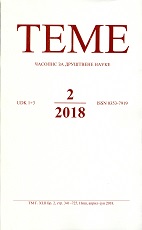Уговорна одговорност – правни режим у упоредном праву
Contractual Liability – Legal Regimes in Comparative Law
Author(s): Katarina Jovičić, Slobodan VukadinovićSubject(s): Civil Law, Law on Economics
Published by: Универзитет у Нишу
Keywords: contractual liability; subjective liability; objective liability; damage compensation
Summary/Abstract: The paper analyses contractual liability, or, more precisely, the obligation to compensate damage, due to (partial or complete) failure to perform, that is, due to nonconformity or delay in performance. Using the dogmatic and comparative method, the authors examine the starting points and features of the legal regime governing the circumstances and events that prevent the debtor from performing the contract, that is, that render performance impossible or exceedingly difficult. Comparing the solutions in various national legislations, the authors conclude that the comparative law does not provide a singular position on the circumstances that relieve the debtor from contractual liability. Taking the analysis a step further, the paper explores the reasons behind these differences in legal systems, where the authors find that these are the consequence of the concept of contractual liability applied in the given legal systems. Two main systems are identified: subjective contractual liability, which is based on the debtors' assumed fault, and objective liability, in which fault is not legally relevant. Having explored the legal frameworks of national legislations, the authors conclude that subjective contractual liability is prevalent in the countries of the European continental system, while objective liability is characteristic of the Anglo-Saxon systems, with certain deviances. From the standpoint of the debtor, opting for subjective contractual liability is more favourable, since the debtor knows, as soon as the contract is breached, that no damages are owned to the creditor if the breach was caused by circumstances the debtor could not have prevented. Conversely, the objective liability system is more beneficial for the creditor, since the debtor's fault, in principle, does not affect the creditor's right to claim damages.
Journal: Teme - Časopis za Društvene Nauke
- Issue Year: XLII/2018
- Issue No: 2
- Page Range: 647-660
- Page Count: 14
- Language: Serbian

